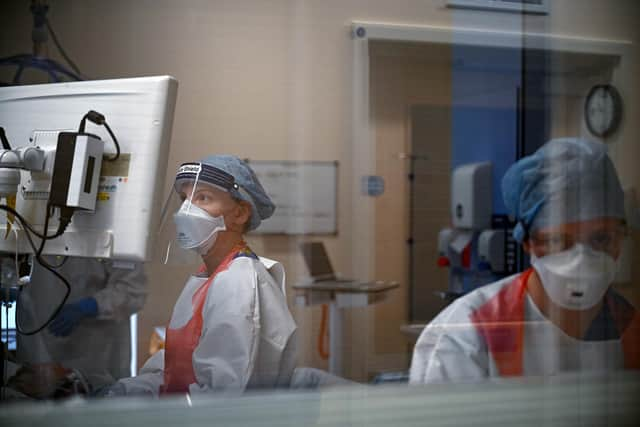Covid Scotland: Half of hospitalised patients develop complication
These had long and short-term impacts on patients, but are different to long Covid symptoms in patients who were not hospitalised.
Complications were more common in men and black people, and young people were also affected.
Advertisement
Hide AdAdvertisement
Hide AdResearchers warned the findings show the risks to young, unvaccinated people, and said this should be considered when easing restrictions.


It comes after a report from the Academy of Medical Sciences warned the triple mix of Covid, flu and respiratory virus RSV could push an already-stretched NHS to “breaking point” over the winter.
A member of the Expert Advisory Group to the report called for better communication and more community involvement in increasing vaccination rates, while opposition parties warned the Scottish Government is set to miss the July 18 target of giving all adults a first dose.
Health secretary Humza Yousaf said the government was doing “everything it can” to encourage adults to take up the vaccine when offered, as 19 deaths within 28 days of a positive Covid test were reported on Thursday, the highest daily figure since March.
A new observational study published in the Lancet is the first to systematically assess a range of in-hospital complications of Covid, and their associations with age, sex and ethnicity.


Complications were mostly renal, respiratory or systemic, but cardiovascular, neurological and gastrointestinal issues were also reported.
The authors warned these will have important short and long-term impacts for patients, healthcare utilisation, healthcare system preparedness, and society.
Researchers highlighted that young people were also affected, with 27 per cent of 19-29-year-olds and 37 per cent of 30-39-year-olds suffering complications.
Advertisement
Hide AdAdvertisement
Hide AdSome 13 per cent of 19-29-year-olds and 17 per cent of 30-39-year-olds were less able to care for themselves after being discharged from hospital.
The study looked at 73,000 cases between January 17 and August 4 last year, involving the Alpha variant and before vaccines were in use.
The risk of complications rose with age, with more than half of over-50s affected.
People of white, South Asian and East Asian ethnicities had similar rates, but they were highest in black people (58 per cent in black patients versus 49 per cent in white patients).
Joint senior author Professor Ewen Harrison from Edinburgh University said: “Patients in hospital with Covid-19 frequently had complications of the disease, even those in younger age groups and without pre-existing health conditions.
"These complications could affect any organ, but particularly the kidney, heart and lungs. Those with complications had poorer health on discharge from hospital, and some will have long-term consequences.
"We now have a more detailed understanding of Covid-19 and the risks posed, even to younger otherwise healthy people.”
He added: “Our review highlights some insightful patterns and trends that can inform healthcare systems and policy maker responses to the impacts of Covid-19.
Advertisement
Hide AdAdvertisement
Hide Ad"Our results can also inform public health messaging on the risk Covid-19 poses to younger, otherwise healthy people at a population level, particularly in terms of the importance of vaccination for this group.”
His warning comes after a report from the Academy of Medical Sciences warned a potential surge in flu, RSV and Covid-19 could cause increased pressure on the NHS.
Authors called for Covid testing to be expanded to include RSV, and for urgent speeding up of the Covid-19 vaccine programme.
One way to achieve this in Scotland is through communication and involving local communities, said Lynn Laidlaw, co-chair of the report’s Patient and Carer Reference Group.
"The practical things that came out in the report was that communication is key, and the communication hasn't been good,” she said.
“Where communication has worked well, it's when people have worked with local communities to communicate in a way that made sense to them … just look at vaccine hesitancy.”
Communication around vaccines should be targeted to the concerns of specific groups, Ms Laidlaw said, adding that questions and points of concern should be responded to and never dismissed.
“I think what we’ve seen is that if you work with local communities, and you take their concerns seriously, then people people will take the vaccine,” she said.
Advertisement
Hide AdAdvertisement
Hide AdMs Laidlaw said access was also a key factor for encouraging uptake, and this improved significantly in Glasgow when vaccination hubs began extending into the community rather than being focused on mass vaccination centres.
She said: “I want to highlight the importance of communities, the importance of communication, the importance of working together, and the importance of involving people in this collective effort.”
The Scottish Government has conceded the vaccine rollout is slowing, with the country not on target to give everyone a first dose by July 18.
Mr Yousaf said while he hopes 90 per cent of adults will have had a first dose by then, he is concerned about uptake in some groups.
He said: “That 90 per cent can mask some of the concerns that I’ve got, particularly as you go lower down the age groups and begin to see less of an uptake – 18 to 29-year-olds for example, by Sunday we might only get to about 70 per cent.
“We’ve got to work really hard, as hard as we possibly can, in the weeks and months to come to do as much ‘mop-up’, as well as doing the second doses, as we possibly can.”
Asked about the rates of younger Scots coming forward, Mr Yousaf said: “There’s no doubt it’s concerning, that’s why we’re doing everything we can.”
He added: “We’re flooding social media. But there’s not one silver bullet, we’re going to have to keep doing as much of this as we possibly can.”
A message from the Editor:
Thank you for reading this article. We're more reliant on your support than ever as the shift in consumer habits brought about by coronavirus impacts our advertisers.
If you haven't already, please consider supporting our trusted, fact-checked journalism by taking out a digital subscription.
Comments
Want to join the conversation? Please or to comment on this article.
